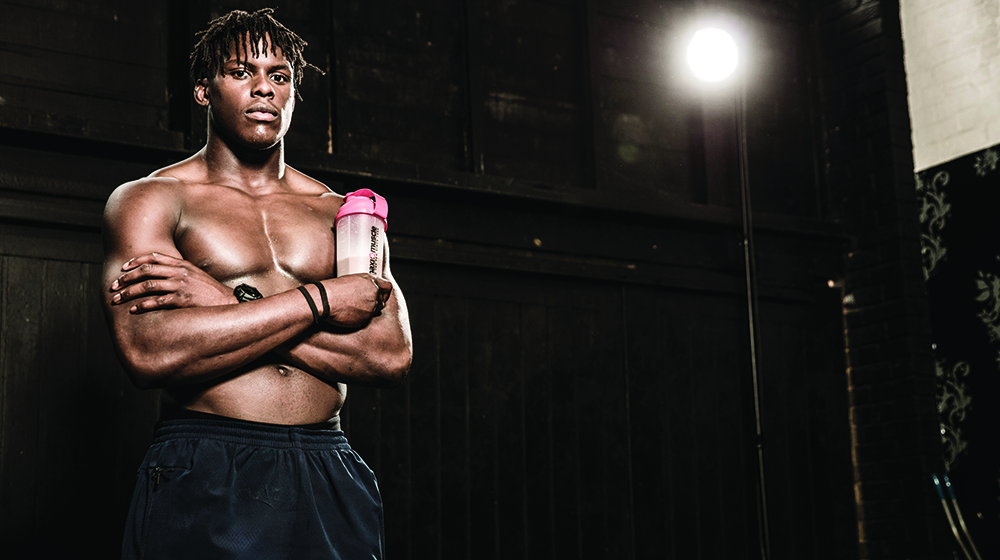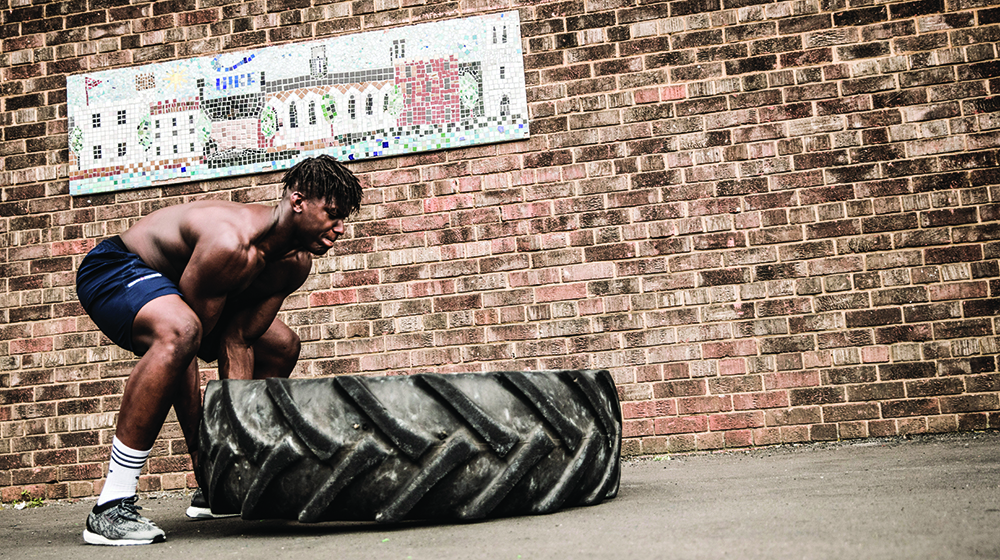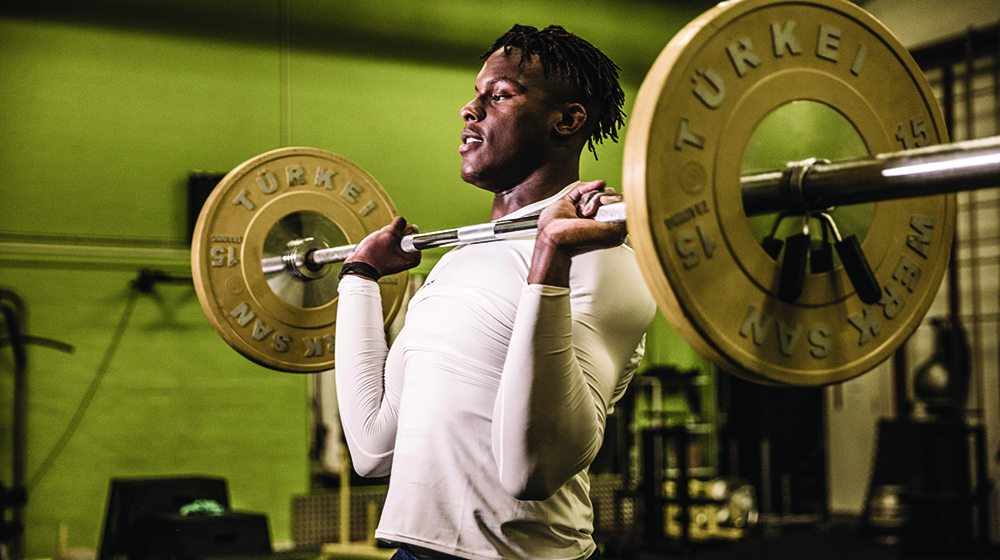
Maro Itoje does not lose rugby matches. In 26 starts last season, he won 26 games for club and country. The England and Saracens forward speaks to Coach's sister publication Men's Fitness about his monster winning streak, training at the original Gold’s Gym and what he wants to achieve in the game.
What a season you’ve just had: 26 starts, 26 wins. A Six Nations Grand Slam. A Premiership. A European Champions Cup. A historic 3-0 series whitewash over Australia. And European Player of the Year, aged 21. How do you follow that up?
Ha! That record (number of starts and wins) changes each time. I don’t know the actual number. Last year was good – it was enjoyable to be involved with Saracens and England. I feel very fortunate to be involved with those teams but the exciting thing is we’re not anywhere near our potential yet. There’s room to grow. We’re hungry and we’re looking to improve. I think the future is going to be brighter than our past.
What do your team-mates make of your record?
I’ve got a little bit of stick for it but all the guys I play with have been a huge part of all of those games – especially all the guys at Saracens. It’s as much their record as it is mine.
You’re doing a politics degree at SOAS in London too – is that going just as well?
I’m in my final year. Things are looking all right… I have a feeling I might have to be at uni a bit more this year which might be quite challenging. With all these things it’s about time management and discipline to know when it’s time to study, when it’s time to train and when it’s time to relax.
We heard you escaped to California to recover over the summer. Did you sneak in a session at the iconic training Mecca of Gold’s Gym near Venice Beach?
I even got the T-shirt (he points to his black Gold’s Gym top). I had four weeks off and stayed in Bel Air for a bit. It was cool, I had a lot of fun out there – it’s a cool place to train. To be fair I was very small in that gym. There were some big units walking about.
Do you enjoy the physical demands of your sport?
I do like training. This off-season I went a couple of weeks without training and I felt like my body was getting withdrawal symptoms. I needed to do something. I struggle to switch off. We train for most of the year so going to the gym is normal, it’s a part of our lives. When you don’t do something that’s normal it tends to feel weird. I missed the routine.
What workouts do you do when the strength and conditioning coaches aren’t watching?
If it was up to me and I’m lifting for fun, it’s beach weights all the way. Biceps curls, abs exercises. For that reason, I fitted in well at Gold’s Gym.
Get the Coach Newsletter
Sign up for workout ideas, training advice, reviews of the latest gear and more.
Have you always been big or have you had to work hard to bulk up?
When I was younger I struggled to put weight on. Now I’m finding it much easier. I need to manage my weight to make sure I don’t put it on too quickly. My metabolism has slowed down. I don’t feel the need to deny myself anything because I’m normally quite good. I just don’t buy them. If it’s not in your house you’re not going to eat it.
RECOMMENDED: How to Bulk up Like Wales Rugby Union Captain Sam Warburton
What about if you’re eating on the go? (MF reminds Maro he grabbed a bacon sandwich and peach iced tea before we sat down for the interview.)
Nah, it was a grilled chicken sandwich. Honest. And iced tea is good for you, right? That’s what I tell myself anyway.
In 2015 you were part of the pre-World Cup training squad under Stuart Lancaster, and this year you worked with Eddie Jones in the Six Nations. What has been the biggest change?
I’m not the best person to ask… I was there for three weeks before the World Cup and in that three weeks we did very little rugby. It was basically just fitness and strength and conditioning. You can’t compare that with when I joined the team with Eddie Jones because we were going straight into a match. But what I would say is he’s come in and made these players even more motivated than they already were, and he’s got that fight and belief back in the team.
Does he put his arm around you or does he challenge you?
He does whatever he thinks is necessary at the time. He’s a very intelligent guy and he knows how to motivate the team and his players. He does what he believes is necessary.
Does he congratulate you?
Of course he does! Every sensible coach will congratulate you when you do well but we’re not where we want to be and until we get there we’ll continue to work hard.
When Jones came in he said he wanted to make training “uncomfortable”. Was he true to his word?
Yeah, training’s tough. Sessions don’t last too long, normally just over an hour, but within that hour it’s intense. It’s very physical and he and the rest of the training staff expect very high standards from everyone. And it’s all rugby relevant – it’s not just fitness. The most important thing is we all know what we’re training for. You can’t just train in the gym and not train on the pitch, because at the end of the day you’re training to be a rugby player. All the stuff you do in the gym has to be transferable to what you want to do on the pitch.
What’s the greatest lesson you’ve learned in your sport?
I’d say it’s that the process creates the result. If your process is to train really well, eat really well, mentally prepare well and have that holistic approach, more often than not you’d expect to have a good performance – if those things are all in place. If you take one of those things for granted, that’s when the performance tends to suffer.
You were England captain for the Under-20 World Cup win in 2014 and are already being talked about as a future senior team captain. So what would you say makes a good leader?
People always ask me this question and I find it’s better to ask people who have captained at the top level. I just try to be myself. I try to add a bit of energy and intensity to the team. I try to lead by example and hopefully say the right thing at the right time and do the right thing at the right time.
Apart from a World Cup, a Lions tour is the only thing missing from your CV. The tour of New Zealand is less than 12 months away… Is it your Everest?
Honestly, I haven’t started thinking about it. I’ve just got back from the off-season and I’ve started pre-season now, so my goal is to get in the best shape possible for the start of the season and hopefully start the season with a bang with Saracens. Hopefully my performances will be at the level I expect them to be and we’ll go from there.
What do you want to work on over the next year to get yourself on that tour?
I want to improve every part of my game. I want to improve my strength, my fitness, my tactical understanding, my collisions. I don’t think I need to be any bigger but if I can work on those things I’ll be the best player I can be.
Train Like a Rugy Star

Generate rugby strength and power with Itoje’s three essential moves
1. Trap Bar Deadlift
Why “If you want to get strong you can’t miss out on the compound lifts,” says Itoje. “Because I’m quite tall I use a trap bar that takes the pressure off my back.”
How Stand in the middle of the hexagon and squat down until you can grab the handles. With a firm grip and keeping your core engaged, shift your weight onto your heels, ensuring your back stays flat and chest stays up. Drive up powerfully through your feet, pushing your hips forwards as you stand. Pause, then lower to the floor.
How many “For strength I do low reps, for speed I do high reps,” says Itoje.
2. Hang Clean

Why “Power across your whole body is essential for rugby,” says Itoje. “You can’t be just bottom-heavy or top-heavy – you have to be all-over powerful for every moment.”
How Hold a barbell with a shoulder-width overhand grip. Hinge forwards at your hips so the bar is just above knee-level. Powerfully drive your hips forwards to straighten up, keeping your core engaged, and simultaneously lift the bar close to your body to chest height. Then quickly drop under the bar to “catch” it at shoulder height and stand up.
How many “For power, keep the reps low – no more than five with lots of rest,” Itoje says.
3. Plank
Why “Core exercises are essential and the old-school plank is my go-to,” says Itoje. “No matter what position you play it’s essential you have a solid base.”
How Position yourself face down resting on your elbows and toes, with your elbows directly below your shoulders and your body in a straight line from head to heels. Squeeze your abs and glutes to stop your hips from sagging. Make it harder by slowly rocking forwards and backwards.
How many “I superset the plank or side plank for a minute with compound lifts to make sure my core is always working,” Itoje says.
Maro Itoje was speaking at the launch of Maximuscle’s new raw ingredient powders. Pre-order now at maximuscle.com

Sam Rider is an experienced freelance journalist, specialising in health, fitness and wellness. For over a decade he's reported on Olympic Games, CrossFit Games and World Cups, and quizzed luminaries of elite sport, nutrition and strength and conditioning. Sam is also a REPS level 3 qualified personal trainer, online coach and founder of Your Daily Fix. Sam is also Coach’s designated reviewer of massage guns and fitness mirrors.
